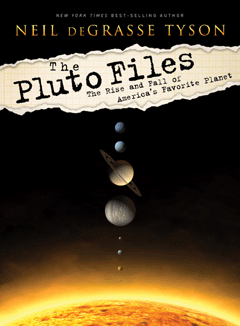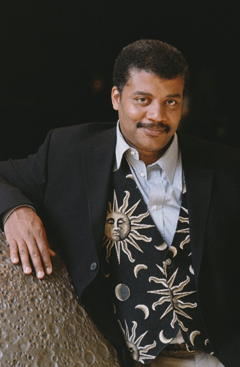The Pluto Files
Air Date: Week of January 23, 2009

Pluto Files book cover
Neil deGrasse Tyson didn't mean to get Pluto demoted from planet status; he just wanted people to think about the solar system differently. But changing the number of planets from nine to eight is just what happened when a debate sparked by the astrophysicist’s Hayden Planetarium exhibit - sans Pluto - ended with the re-categorization of the icy rock to "dwarf planet" status. Dr. Tyson tells his story - and the story of Pluto - in his new book "The Pluto Files: The Rise and Fall of America's Favorite Planet.” He talks with host Steve Curwood.
Transcript
CURWOOD: My Very Educated Mother Served Us Nine Pizzas - sound familiar? Or maybe you know: My Very Excellent Monkey Just Sat Under Noah's Porch?
Mnemonics like these have helped generations and generations of American school children learn the names of the planets in the solar system: Mercury Venus Earth Mars Saturn Uranus Neptune - and Pluto.
That is, until 2006 when the international scientific community kicked Pluto out of the planetary club and, in doing so, turned the world upside down for millions of Americans.
Astrophysicist Neil deGrasse Tyson initiated the re-categorization of Pluto in the year 2000, when-- as director of the Hayden Planetarium at the American Museum of Natural History-- he chose to exhibit a model of the solar system without little Pluto as the ninth planet.
He joins me now to talk about his new book "The Pluto Files: The Rise and Fall of America's Favorite Planet."
So Mr. Tyson, you’re the guy who got Pluto demoted to a dwarf planet-- what do you have to say for yourself?
TYSON: Well, I didn’t I didn’t – well first, Pluto had it coming. Let’s just establish that, first of all. Second, it’s not like I demoted it. In the museum exhibit, we just said take a look at the solar system. You have Mercury, Venus, Earth and Mars. They’re all small and rocky. And they’re more like each other than any one of them is like other stuff in the solar system. So that became a group. And then you look at the asteroid belt as a group. And then the gas giants – that’s a group. And then the ice bodies in the outer solar system. That’s all we did. And the New York Times discovered this fact about what we did and a page one story appeared, titled “Pluto Not a Planet? Only in New York.” And that’s when all the hate mail started coming in from elementary school children.
I have this five-inch thick file of paper correspondence, but some of the letters sort of rose above the rest in terms of how innovative or how clever or how charming they were. There's a letter from a girl, Madeline Yost, who said “Dear Dr. Tyson, why did you take away my favorite planet? Here's a picture of it, this is what it looks like, put it back in, write back soon, but not in cursive, I don't know how to read cursive yet.”

Dr. Neil deGrasse Tyson (Courtesy of Dan Deitch)
[LAUGHING]
TYSON: It’s the cutest thing.
[LAUGHING]
CURWOOD: So why were people really ticked off at you and so upset. Science is constantly changing. Why all the upset about Pluto?
TYSON: The upset wasn’t everybody. The people who were most upset were Americans - because an American discovered it. Europe, they couldn’t care less what you call Pluto. And so, thinking long and hard about this, I could not help but blame at least part of this emotional attachment on the fact that we have a dog named Pluto owned by Mickey, drawn by Disney. What else do we have to show the world but our computers, our jets and Disney?
CURWOOD: So in order for the vote to come down against Pluto, the scientific community had to define what planets are. So, Neil Tyson, tell me: what are planets exactly and what else do we know about the nether regions of our solar system?
TYSON: So they got, in the end, defined by vote to be an object large enough to be round - because if you’re large enough, gravity forces you to be round. That’s criterion number one. Number two: do you dominate all other objects that share your orbit. If those two criteria apply to you, then you are a planet. Pluto is round, but there are thousands of other objects in orbit with it in the Kuiper belt comet. It hasn’t cleared its orbit. It’s a dwarf planet.
CURWOOD: Is that politically correct, though? I mean, is it fair to discriminate against dwarves?
TYSON: [laughs] No. But science – actually, I have to say quickly, when Pluto has demoted Mickey issued – Mickey Mouse issued a memo to the Disney community saying that it’s okay that Pluto was demoted because the Seven Dwarves will now welcome him as an eighth dwarf.
[LAUGHING]
TYSON: So. And those dwarves are no less loveable for being dwarves. In fact, they’re more loveable. So they voted that Pluto would not be considered a planet, and a new word was introduced for round objects beyond Neptune – they’re called Plutoids. So Pluto is sort of the benchmark case of a Plutoid. And there are many people who didn’t like the vote.
CURWOOD: This all sounds very political. In fact, even though the scientific community changed the nomenclature, a couple of states refused to accept that Pluto is a dwarf planet. I’m look, as a matter of fact, in your book – you have in your appendix California legislation relative to Pluto’s planetary status. It says that “the mean spirited International Astronomical Union decided to disrespect Pluto by stripping Pluto of its planetary status and reclassifying it as a lowly dwarf planet.”

CURWOOD: What about Jupiter? Now, as I understand - in fact, I think Neil Tyson once told me that Jupiter give off more energy than it takes in. So…
TYSON: That’s right.
CURWOOD: …isn’t it some kind of a star rather than a planet?
TYSON: Well, so here you go. So, rather than have the word planet refer to something so large and gaseous and energetic as Jupiter in the same breath as something as small as Pluto that’s icy, that’s not any longer a useful word if both of those objects are in the same classification. So why not think of the solar system as all kinds of objects that you might want to think about and talk about. Jupiter gives off more energy than it takes in. That’s a certain kind of planet. In the old days, all there were were points of light in the sky. Maybe you knew what color they were. So you put them all together, call them planets. You’re done. But now we’ve been there, we’ve landed on them. We know what they’re made of. They’ve got magnetic fields and atmospheres and methane and carbon dioxide and moon systems and rings and there’s too much else to talk about to sit there and smile because you can recite the names of what you think is the important category called the planet.
CURWOOD: By the way, you mentioned methane.
TYSON: Ooh, yeah, that slipped out.
CURWOOD: … on the other planets. So what’s going on with – what’s this about methane on Mars. I mean, to me, I mean, you get methane from a garbage dump. Does that mean something is rotting there?
TYSON: You can get methane in a bunch of ways. But one of the easiest ways to get methane is by the action of microbes, microbes that digest their food in environments were there is little to no oxygen. And not only that, methane doesn’t last very long chemically. So if you see it anywhere, as it has been discovered on Mars, just recently – if you see it, it means it’s been freshly made. So, what’s tantalizing is the prospect that this methane is a biomarker for the actions of microbes deep within the soils of Mars.
CURWOOD: Which would mean, of course, life on Mars.
TYSON: Life on Mars. Not the kind with antennae and ray guns, but microbes would be just fine. If you’re a biologist any kind of life at all to compare with life on earth is – would transform the field.
CURWOOD: Neil deGrasse Tyson is an astrophysicist and author of the new book “The Pluto Files: The Rise and Fall of America’s Favorite Planet.” Mr. Tyson, thank very much.
TYSON: Thanks for having me.
Links
For more on the book “The Pluto Files: The Rise and Fall of America’s Favorite Planet,” click here
Living on Earth wants to hear from you!
Living on Earth
62 Calef Highway, Suite 212
Lee, NH 03861
Telephone: 617-287-4121
E-mail: comments@loe.org
Newsletter [Click here]
Donate to Living on Earth!
Living on Earth is an independent media program and relies entirely on contributions from listeners and institutions supporting public service. Please donate now to preserve an independent environmental voice.
NewsletterLiving on Earth offers a weekly delivery of the show's rundown to your mailbox. Sign up for our newsletter today!
 Sailors For The Sea: Be the change you want to sea.
Sailors For The Sea: Be the change you want to sea.
 The Grantham Foundation for the Protection of the Environment: Committed to protecting and improving the health of the global environment.
The Grantham Foundation for the Protection of the Environment: Committed to protecting and improving the health of the global environment.
 Contribute to Living on Earth and receive, as our gift to you, an archival print of one of Mark Seth Lender's extraordinary wildlife photographs. Follow the link to see Mark's current collection of photographs.
Contribute to Living on Earth and receive, as our gift to you, an archival print of one of Mark Seth Lender's extraordinary wildlife photographs. Follow the link to see Mark's current collection of photographs.
 Buy a signed copy of Mark Seth Lender's book Smeagull the Seagull & support Living on Earth
Buy a signed copy of Mark Seth Lender's book Smeagull the Seagull & support Living on Earth

